Having less sleep could help people suffering with traumatic memories and flashbacks
A study led by the University of Oxford found that those who were sleep deprived had fewer intrusive memories that those who slept normally

A good night’s sleep is often thought of as a cure for all ills, but for those who have experienced a traumatic event, sleeping may be one of the worst things to do.
Depriving oneself of sleep could prevent those suffering experiencing flashbacks of traumatic memories, according to a new study led by the University of Oxford.
Researchers at Oxford’s Sleep and Circadian Neuroscience Institute found that people who had less sleep had recalled fewer traumatic memories. Showing 42 volunteers emotional film clips of traumatic scenes, researchers monitored how the recipients responded after varying amounts of sleep.
The volunteers were either kept in a laboratory and deprived of sleep or sent home to have a normal night’s sleep in their own bed. Keeping a diary, they recorded any intrusive memories they experienced while they slept.
Although both groups experienced more involuntary memories in the first two days after watching the films, with the number reducing in the following days, the sleep deprived group, it found, experienced fewer intrusive memories that those who slept normally.
Dr Katharina Wulff, from the SCNi, said: ‘We know that sleep improves memory performance including emotional memory, but there may be a time when remembering in this way is unhelpful.’
According to Dr Kate Porcheret, from the Nuffield Department of Clinical Neurosciences, it is still common for patients to receive sedatives after a traumatic event to help them sleep even though for very traumatised people this may be the wrong approach.
Dr Porcheret said: “Finding out more how sleep and trauma interact means we can ensure people are well cared for after a traumatic event… we need more research in both experimental and clinical settings into how our response to psychological trauma is affected by sleep – and lack of sleep too.”
The team behind the study have said that currently there is a limited understanding of intrusive memories of emotional events as well as how sleeping corresponds to real life trauma and that more research is needed.
Join our commenting forum
Join thought-provoking conversations, follow other Independent readers and see their replies
Comments